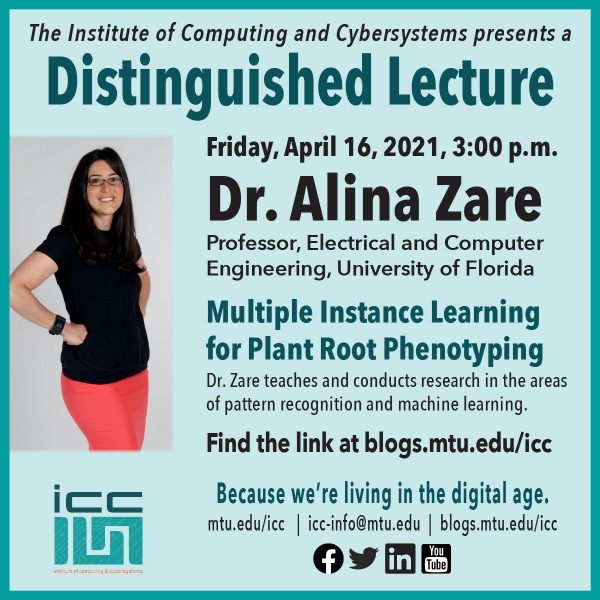
The Institute of Computing and Cybersystems will present a Distinguished Lecture by Dr. Alina Zare on Friday, April 16, 2021, at 3:00 p.m.
Her talk is titled, “Multiple Instance Learning for Plant Root Phenotyping.”
Dr. Zare is a professor in the Electrical and Computer Engineering department at University of Florida. She teaches and conducts research in the areas of pattern recognition and machine learning.
Lecture Title
Multiple Instance Learning for Plant Root Phenotyping
Lecture Abstract
In order to understand how to increase crop yields, breed drought tolerant plants, investigate relationships between root architecture and soil organic matter, and explore how roots can play in a role in greenhouse gas mitigation, we need to be able to study plant root systems effectively. However, we are lacking high-throughput, high-quality sensors, instruments and techniques for plant root analysis. Techniques available for analyzing root systems in field conditions are generally very labor intensive, allow for the collection of only a limited amount of data and are often destructive to the plant. Once root data and imagery have been collected using current root imaging technology, analysis is often further hampered by the challenges associated with generating accurate training data.
Most supervised machine learning algorithms assume that each training data point is paired with an accurate training label. Obtaining accurate training label information is often time consuming and expensive, making it infeasible for large plant root image data sets. Furthermore, human annotators may be inconsistent when labeling a data set, providing inherently imprecise label information. Given this, often one has access only to inaccurately labeled training data. To overcome the lack of accurately labeled training, an approach that can learn from uncertain training labels, such as Multiple Instance Learning (MIL) methods, is required. In this talk, I will discuss our team’s approaches to characterizing and understanding plant roots using methods that focus on alleviating the labor intensive, expensive and time consuming aspects of algorithm training and testing.
Speaker Bio
Dr. Zare earned her Ph.D. in December 2008 from the University of Florida. Prior to joining the faculty at the University of Florida in 2016, she was a faculty member at the University of Missouri.
Zare’s research has focused primarily on developing machine learning and pattern recognition algorithms to autonomously understand and process non-visual imagery. Her research work has included automated plant root phenotyping using visual and X-ray imagery, 3D reconstruction and analysis of X-ray micro-CT imagery, sub-pixel hyperspectral image analysis, target detection and underwater scene understanding using synthetic aperture sonar, LIDAR data analysis, Ground Penetrating Radar analysis, and buried landmine and explosive hazard detection.
